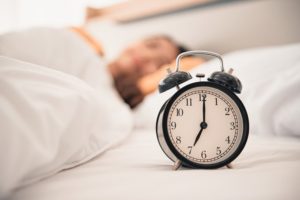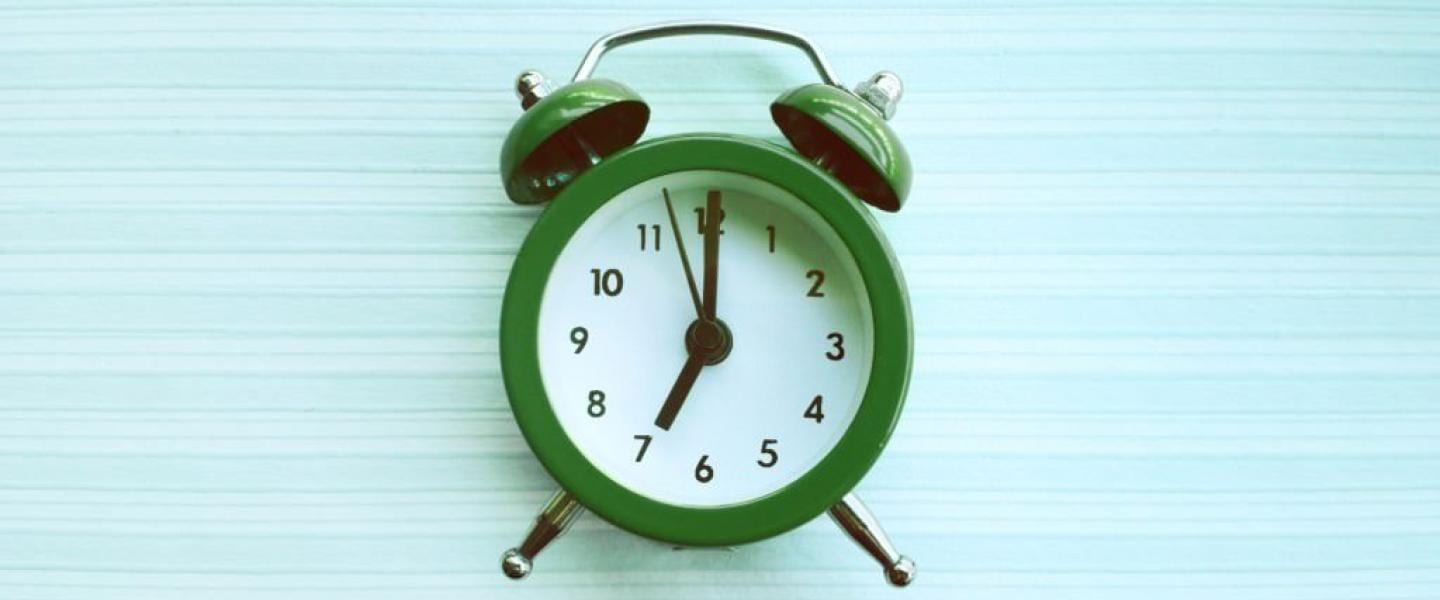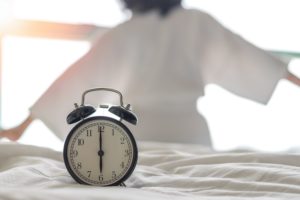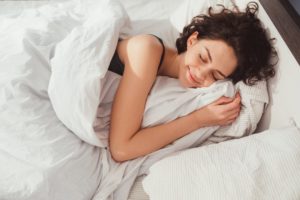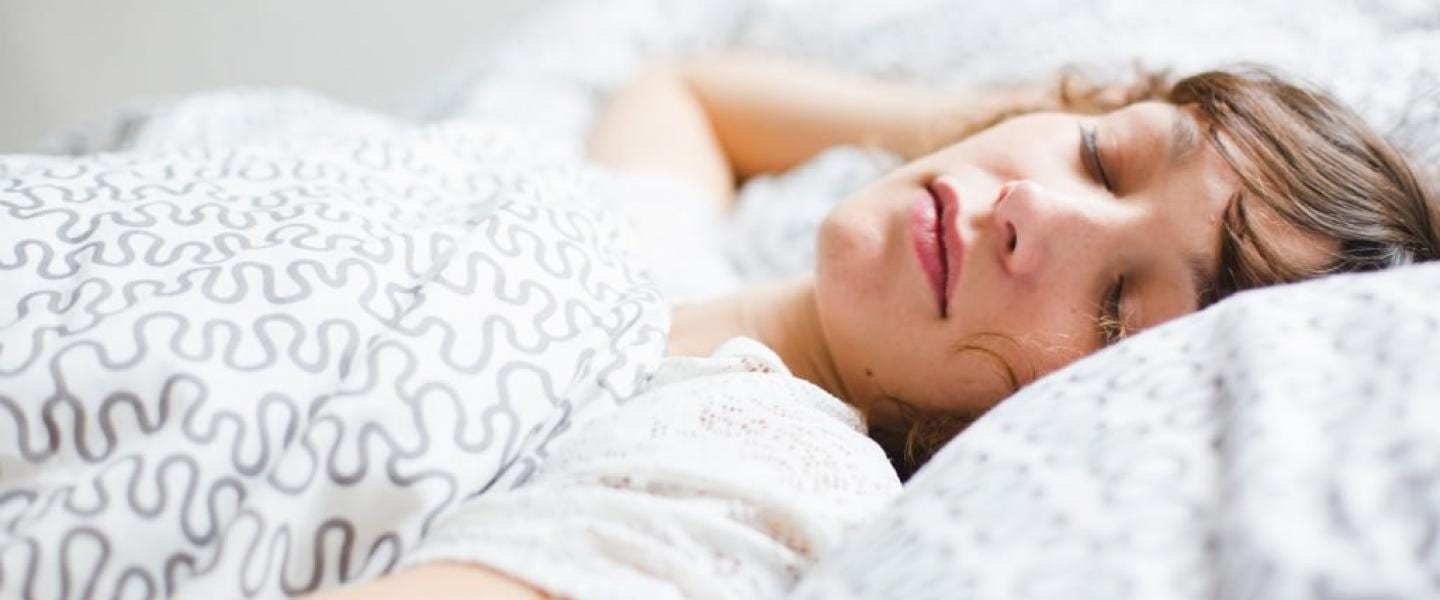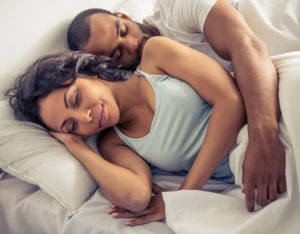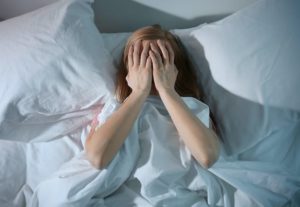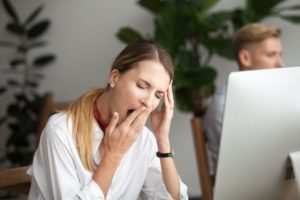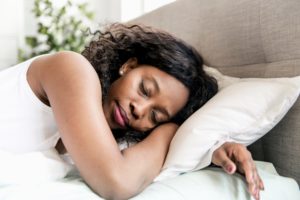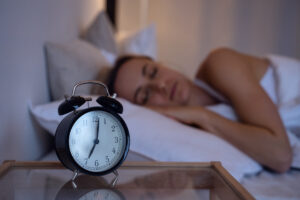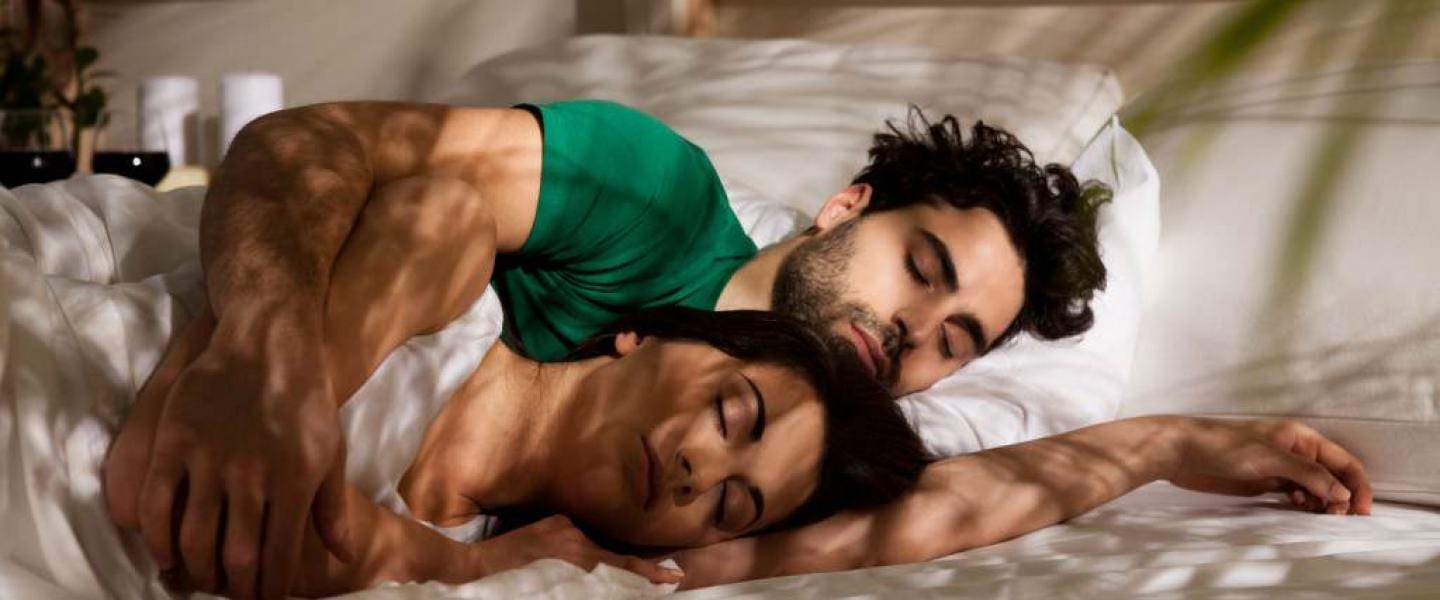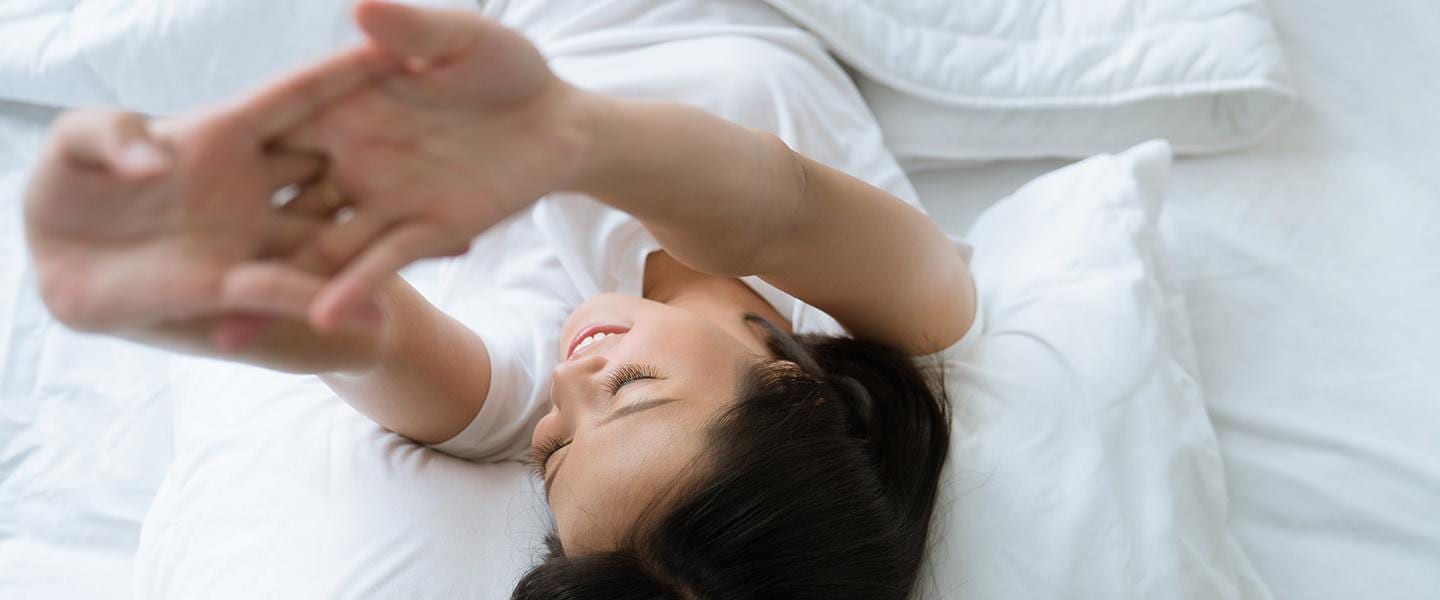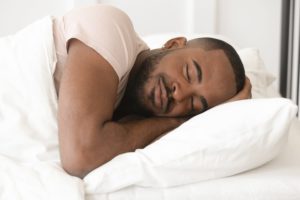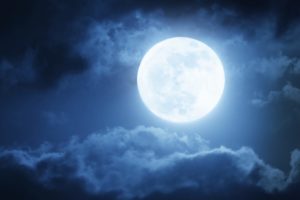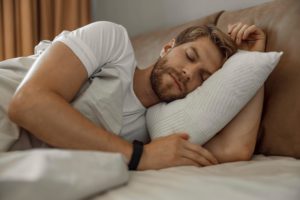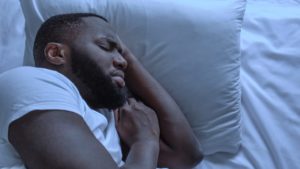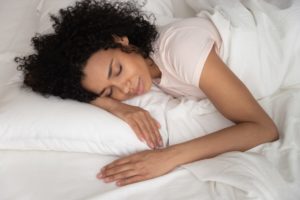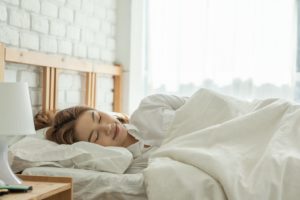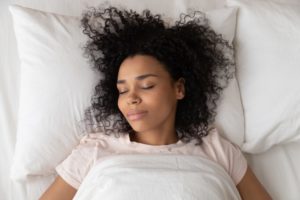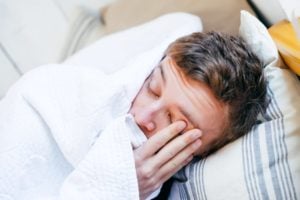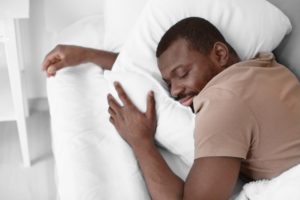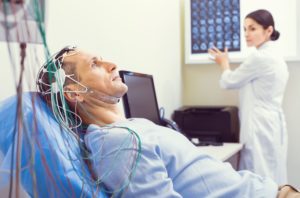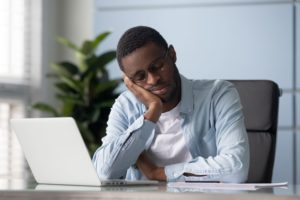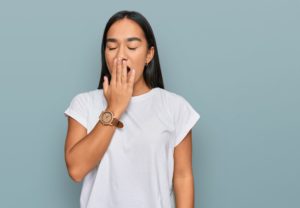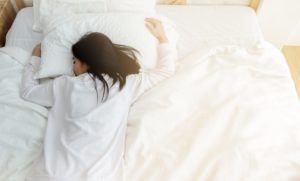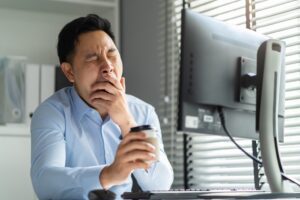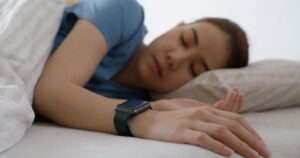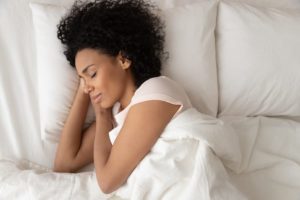When you buy through our links, we may earn a commission. Products or services may be offered by an affiliated entity. Learn more.
REM Rebound: Causes and Effects
- REM rebound occurs when the body compensates for lost sleep by increasing REM sleep duration in subsequent sleep cycles.
- Factors like stress, substance use, and sleep loss can lead to REM rebound.
- Manage REM rebound by prioritizing quality sleep and speaking to a doctor about any sleep issues.
Generally, rebound sleep refers to an increased amount of sleep a person receives as a result of being sleep deprived or stressed during waking hours. Sleep is organized into different stages, which can be broadly categorized into rapid eye movement (REM) and non-rapid eye movement (NREM). When a person experiences rebound sleep, they can experience an increase in REM sleep, NREM sleep, or both.
Like rebound sleep in general, REM rebound sleep usually occurs in response to sleep deprivation or stress. REM rebound can also occur in response to a suppression of REM sleep in particular. A person experiencing REM rebound might sleep more than normal, or sleep a normal amount, but spend a higher proportion of that sleep in a REM stage.
What Is REM Rebound?
REM rebound, also called REM rebound sleep or the REM rebound effect, is a phenomenon in which a person temporarily receives more REM sleep than they normally would. During REM rebound, the time spent in REM can increase, along with the frequency and intensity of REM sleep stages.
Most people associate REM sleep with dreams. Although it is not the only sleep stage during which we dream, REM sleep is characterized by rapid eye movements and brain activity patterns that are very similar to the patterns we experience while we are awake. The majority of REM sleep tends to occur once people have been asleep for a while, meaning it may not occur as often for people with a disrupted sleep schedule.
REM rebound often occurs after stress or sleep deprivation, and it happens in both humans and animals. It is not unique to a single culture and appears to happen to people around the world.
Looking to improve your sleep? Try upgrading your mattress.
What Causes REM Rebound?
Just as experts still do not fully understand how sleep works, they also do not fully understand the causes of REM rebound sleep. However, by studying both humans and animals, ranging from rats to fur seals, researchers have identified multiple potential causes and factors related to REM rebound sleep. Several hormones in particular likely play a role:
- Corticotropin-releasing hormone (CRH)
- Adrenocorticotropic hormone (ACTH)
- Plasma corticosterone
- Corticotropin-like intermediate peptide (CLIP)
- Prolactin (PRL)
- Serotonin (5-HT)
More research is required to better understand how these hormones work together to increase REM sleep during a REM rebound effect. Although the underlying mechanisms of REM rebound are not fully understood, researchers have identified multiple life factors that seem to cause REM rebound. Most commonly, REM rebound appears to occur in response to sleep deprivation, stress, and suppressed REM sleep.
Sleep Deprivation
Sleep deprivation is a leading cause of REM rebound sleep. Sleep deprivation occurs when a person does not sleep for the recommended minimum of seven hours each night. The prevalence of sleep deprivation has increased over the last decade, with about one-third of Americans not receiving enough sleep on average.
Sleep deprivation can negatively affect mood and increase the risk of health problems. People may experience sleep deprivation for multiple reasons, such as lifestyle habits, underlying sleep disorders, and work schedules.
Research shows that longer periods of sleep deprivation may be necessary to trigger REM rebound. In one study, sleepers who were deprived of three to six hours of sleep only experienced NREM rebound. Experiencing 12 to 24 hours of sleep deprivation increased both REM and NREM sleep, while more than 96 hours of sleep deprivation resulted in significant REM rebound sleep.
Significant Stress
Experiencing a stress response can prompt REM rebound sleep. Researchers theorize that the REM stage of sleep helps people regulate emotions and reframe negative experiences encountered during the day. As a result, experiencing increased REM sleep after daytime stressors might be an adaptive response. Obtaining more REM sleep after a traumatic event may diminish the chances of developing post-traumatic stress disorder (PTSD).
The amount of time spent in a stress response closely relates to how much of a REM rebound is experienced later. Studies on animals indicate that REM rebound can be seen after just 30 minutes of exposure to a stressor. The percentage of sleep spent in REM rebound increases as the stress response time increases, peaking at a two-hour stress response. Beyond that, the REM response rapidly falls. This pattern might explain why stress makes people require more sleep up to a certain point, but become sleep deprived if they experience too much stress.
Research has also found that both REM suppression and stress cause similar changes in certain hormone and neurotransmitter levels. These similarities could account for the REM rebound that occurs after stress.
Drug Withdrawal
Psychotropic drugs such as antidepressants and some antipsychotics are known to suppress REM sleep. Discontinuing these medications might involve a withdrawal period during which a person could experience REM rebound. During this period, a person withdrawing from antidepressants might notice they experience more intense dreams.
Recreational drug and alcohol use may also contribute to REM rebound. For example, cocaine has been found to suppress REM sleep. Likewise, alcohol suppresses REM sleep and can spur REM rebound. Cannabis promotes sleep generally, but suppresses the REM sleep stage in particular. As a result, regular cannabis users might experience REM rebound as they withdraw from using cannabis. This withdrawal period might be marked by strange dreams.
Certain classes of sleep medications, such as benzodiazepines and barbiturates, suppress REM sleep. As a result, these sleep medications could lead to REM rebound when they are discontinued. Non-benzodiazepine sleep medications and over-the-counter sleep aids, on the other hand, are not known for suppressing REM sleep or prompting REM rebound.
Using CPAP Machines for the First Time
In people who have obstructive sleep apnea, using a continuous positive airway pressure (CPAP) machine treatment for the first time often appears to trigger REM rebound. This is likely due to the fact that people with sleep apnea habitually experience disrupted sleep, which is reversed once the CPAP therapy facilitates better sleep architecture. Along these lines, experiencing REM rebound when using a CPAP machine for the first time is positively associated with continuing to use a CPAP machine over time.
What Going Into REM Rebound Means
Going into REM rebound is the human body’s natural and normal response to sleep deprivation, stressors, and suppression of REM sleep. Despite the similarities in name, REM rebound is not necessarily related to REM sleep behavior disorder, a disorder in which sleepers act out their dreams.
Generally, experiencing REM rebound does not indicate that a person has an underlying sleep disorder. That said, REM rebound episodes are often triggered by sleep deprivation. Since many people with sleep disorders experience sleep deprivation, REM rebound tends to occur in people with parasomnias, narcolepsy, and obstructive sleep apnea.
How to Know if You Experience REM Rebound
Though vivid dreams or nightmares might be a clue, the most accurate way to determine if you are experiencing REM rebound sleep is by having an electroencephalogram (EEG) measure your brain waves as you sleep. EEG measurements are one element of a sleep study, also called polysomnography. However, for most people who undergo a sleep study, information about REM rebound activity will not be included in the results.
Usually, professionals only identify REM rebound in research study participants, not clinical patients. Although REM rebound might occur in conjunction with sleep disorders, REM rebound itself is not a diagnosis or a diagnostic criterion. As a result, doctors in a clinical setting do not have a need to identify REM rebound incidences in the people they treat.
When to Talk to Your Doctor
REM rebound is not necessarily a topic you would need to talk to your doctor about, but sleep disorders are worth discussing with your physician. If you believe you have a sleep disorder, such as sleep deprivation, daytime sleepiness, or irregular sleep patterns, do not hesitate to make an appointment with a healthcare professional. A sleep specialist can help address any underlying issues and develop a treatment plan.
The sleep deprivation caused by sleep disorders can negatively impact a person’s health and quality of life, so diagnosing and treating them are important. If you are struggling with sleep, your doctor can evaluate your symptoms, order tests, and figure out an appropriate treatment plan to help you get the restorative sleep you need. REM rebound sleep generally diminishes as your overall sleep improves.

Still have questions? Ask our community!
Join our Sleep Care Community — a trusted hub of product specialists, sleep health professionals, and people just like you. Whether you’re searching for the perfect mattress or need expert sleep advice, we’ve got you covered. Get personalized guidance from the experts who know sleep best.
References
13 Sources
-
Machado, R. B., Rocha, M. R., & Suchecki, D. (2017). Brain prolactin is involved in stress-induced REM sleep rebound. Hormones and Behavior, 89, 38–47.
https://pubmed.ncbi.nlm.nih.gov/28017595/ -
Lyamin, O. I., Kosenko, P. O., Korneva, S. M., Vyssotski, A. L., Mukhametov, L. M., & Siegel, J. M. (2018). Fur seals suppress REM sleep for very long periods without subsequent rebound. Current Biology, 28(12), 2000–2005.
https://pubmed.ncbi.nlm.nih.gov/29887309/ -
Beersma, D. G., Dijk, D. J., Blok, C. G., & Everhardus, I. (1990). REM sleep deprivation during 5 hours leads to an immediate REM sleep rebound and to suppression of non-REM sleep intensity. Electroencephalography and Clinical Neurophysiology, 76(2), 114–122.
https://pubmed.ncbi.nlm.nih.gov/1697239/ -
Consensus Conference Panel, Watson, N. F., Badr, M. S., Belenky, G., Bliwise, D. L., Buxton, O. M., Buysse, D., Dinges, D. F., Gangwisch, J., Grandner, M. A., Kushida, C., Malhotra, R. K., Martin, J. L., Patel, S. R., Quan, S. F., Tasali, E., Non-Participating Observers, Twery, M., Croft, J. B., Maher, E., … Heald, J. L. (2015). Recommended amount of sleep for a healthy adult: A joint consensus statement of the American Academy of Sleep Medicine and Sleep Research Society. Journal of Clinical Sleep Medicine, 11(6), 591–592.
https://pubmed.ncbi.nlm.nih.gov/25979105/ -
Sheehan, C. M., Frochen, S. E., Walsemann, K. M., & Ailshire, J. A. (2019). Are U.S. adults reporting less sleep?: Findings from sleep duration trends in the National Health Interview Survey, 2004–2017. Sleep, 42(2), zsy221.
https://pubmed.ncbi.nlm.nih.gov/30452725/ -
MedlinePlus: National Library of Medicine (US). (2014, April 14). Healthy Sleep.
https://medlineplus.gov/healthysleep.html -
Suchecki, D., Tiba, P. A., & Machado, R. B. (2012). REM sleep rebound as an adaptive response to stressful situations. Frontiers in Neurology, 3, 41.
https://pubmed.ncbi.nlm.nih.gov/22485105/ -
Schierenbeck, T., Riemann, D., Berger, M., & Hornyak, M. (2008). Effect of illicit recreational drugs upon sleep: Cocaine, ecstasy and marijuana. Sleep Medicine Reviews, 12(5), 381–389.
https://pubmed.ncbi.nlm.nih.gov/18313952/ -
Veatch L. M. (2006). Disruptions in sleep time and sleep architecture in a mouse model of repeated ethanol withdrawal. Alcoholism, Clinical and Experimental Research, 30(7), 1214–1222.
https://pubmed.ncbi.nlm.nih.gov/16792570/ -
Koo, B. B., Wiggins, R., & Molina, C. (2012). REM rebound and CPAP compliance. Sleep Medicine, 13(7), 864–868.
https://pubmed.ncbi.nlm.nih.gov/22705243/ -
Brillante, R., Cossa, G., Liu, P. Y., & Laks, L. (2012). Rapid eye movement and slow-wave sleep rebound after one night of continuous positive airway pressure for obstructive sleep apnoea. Respirology (Carlton, Vic.), 17(3), 547–553.
https://pubmed.ncbi.nlm.nih.gov/22309157/ -
The Manual’s Editorial Staff. (2020, September). Electroencephalography (EEG). Merck Manual Consumer Version.
https://www.merckmanuals.com/home/quick-facts-brain,-spinal-cord,-and-nerve-disorders/diagnosis-of-brain-spinal-cord-and-nerve-disorders/electroencephalography-eeg -
A.D.A.M. Medical Encyclopedia. (2020, January 29). Polysomnography. MedlinePlus.
https://medlineplus.gov/ency/article/003932.htm



